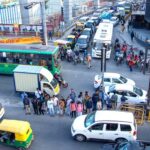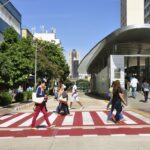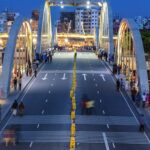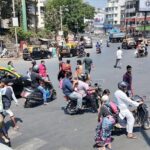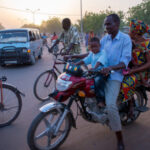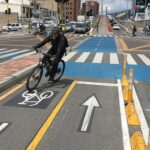Posts tagged with 'road fatalities'
Road traffic crashes kill about 1.19 million people each year and seriously injure another 20 million to 50 million. Pedestrians, cyclists and motorcyclists — the most vulnerable road users — account for half of these deaths and injuries. Even people in motor ...

What does it take for cities to create a true systems change that creates a holistic, positive shift of the entire urban system? Finding and celebrating examples of this feat is at the heart of the WRI Ross Center Prize for Cities. Since ...

Transforming Transportation 2025 is in the books. After a year of geopolitical turmoil and escalating climate impacts, the transport sector is seeing rapid change on multiple fronts. Across two days of events, leaders in government, business, academia and civil society ...

India’s vibrant streets, a reflection of its dynamic culture, are unfortunately also the setting of a grim reality. Every year, approximately 150,000 people die on Indian roads, which translates to an average of 47 accidents and 18 deaths every hour. In ...

In the stylish Grünerløkka neighborhood in Oslo, construction workers are busy rehabilitating Sophies Minde, an old medical clinic, into a new nursery school and maternal health center. Tidy piles of building materials along the perimeter of the construction site wait ...

Since the mid-2010s, cities around the globe have witnessed the explosion of free-floating electric bikes, mopeds and scooters on their streets. NUMO, the New Urban Mobility alliance, began tracking this phenomenon in 2019 with the New Mobility Atlas. Between 2019 and ...

Urban development in many cities around the world prioritizes making space for cars over pedestrians, cyclists or public transportation. In Brazil, this design led to an average of more than 30,000 annual road crash fatalities nationwide by the turn of the century, ...

Electric vehicle sales have been growing exponentially due to falling costs, improving technology and government support. Globally, 10% of passenger vehicles sold in 2022 were all-electric, according to analysis of data from the International Energy Agency. That’s 10 times more than ...

You start the day frustrated, your alarm clock ringing 30 minutes earlier than usual to try to beat the thousands of other morning commuters out the door. Battling bottlenecks has become your daily drill, from the side road shortcuts to ...

As cities become more congested, traffic fatalities continue to rise and the impacts of climate change escalate, the need for sustainable and safe transportation solutions has reached a critical juncture. The World Health Organization reports an alarming statistic: 186,300 children ...

Most people in India walk – to work, to the market or to the railway station. According to the 2011 Indian census, 48% of people walk or cycle to work every day compared to the less than 3% of people ...

After two years of unprecedented disruption to transport globally and two years of virtual conferences, Transforming Transportation returned to Washington, DC, March 14-15. More than 900 policymakers, experts and leaders in transport gathered at the World Bank Headquarters to explore ...

Transportation is a crucial enabler of economic development, providing people access to markets, employment, education, and health services. In addition to these development benefits, improving transport systems by making them cleaner, safer, more inclusive and more resilient accelerates climate action ...

“I find it scary to cross this junction. I literally have to run to save my life,” says Varsha, a resident of Bengaluru in southern India who crosses the Balekundri Circle in the central part of the city every day. ...

The grave consequences of road traffic crashes are not a common theme in election campaigns. Nevertheless, the legislatures of Chile, Mexico and Colombia have recently advanced or are in the midst of debating valuable legislation to reduce traffic deaths and ...













